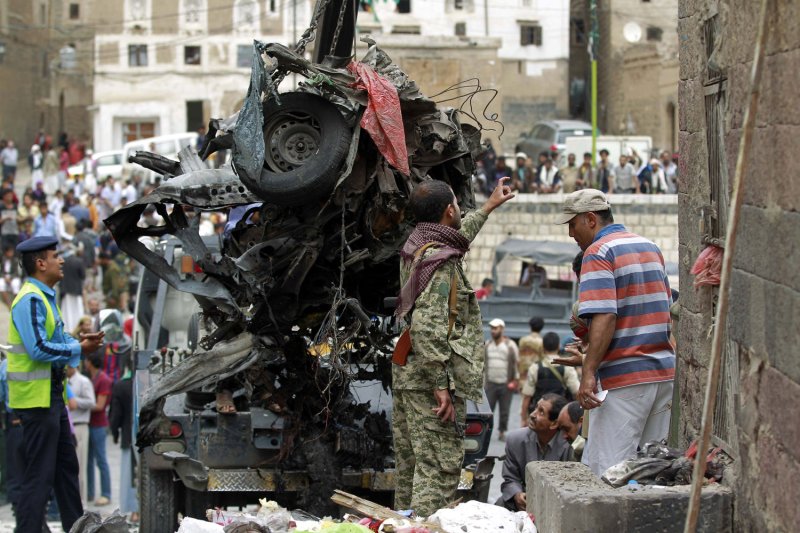Saudi Arabia's Yemen Dilemma
Saudi Arabia's Yemen Dilemma | Foreign Affairs
Saudi Arabia, perpetually in fear of chaos and instability, is a leading force in the counterrevolution against the Arab Spring. As a self-identified bulwark of stability and conservatism, Riyadh wants no change in the political structures or balance of power in the Middle East and is threatened by the potential emergence of representative forms of government in its neighborhood.
This policy has been strikingly evident in its dealings with Bahrain: in February, the Saudi royal family told the country's al-Khalifa dynasty to brook no compromise with the opposition and to crush the demonstrations. Riyadh sees the possibility of Bahrain's Shiite majority population taking power as a threat that could lead to Iranian dominance -- a prospect that is wholly unacceptable to Saudi Arabia.
Yet in Yemen, Saudi Arabia has gone from supporting the rule of Yemeni President Ali Abdullah Saleh to essentially strong-arming him into coming to Riyadh for medical treatment after a bomb attack at his presidential palace earlier this month. In Saudi Arabia's eyes, Saleh's hold on power became increasingly weak and untenable after months of protests, and Riyadh realized he has become a threat to stability rather than a protector of it.
In Yemen, political actors are more numerous, autonomous, fractious, and militarized than they are in other countries on the Arabian Peninsula. Yemen cannot be stabilized by the sorts of tactics that Riyadh has used elsewhere: a small show of force, the backing of one faction over another, the raising of the specters of sectarianism and Iran's nefarious hand, or simply throwing money at the problem. Bringing order to Yemen will require Saudi Arabia to find an acceptable alternative to Saleh -- a proposition that is easier said than done.
Saudi Arabia has historically tried to keep Yemen's central government weak and its political actors divided. Saudi Arabia has historically tried to keep Yemen's central government weak and its political actors divided. The thought of a strong and united Yemen gives the Saudi royals pause: Yemen is the most populous country in the Arabian Peninsula, with 24 million people, a population that is heavily armed, tribal, and impoverished. To maintain its influence over the decades, Riyadh has cultivated discrete relationships with many of Yemen's political leaders (who serve in government) and tribal sheikhs (who form a counterweight to the central government).
Riyadh has not hesitated to punish Sana'a whenever it has expressed an independent policy. For example, during the Gulf War, when Saleh sided with Iraq's Saddam Hussein against Kuwait and the Saudi-led coalition, Saudi Arabia expelled nearly a million Yemeni migrant workers and cut off official aid to Yemen. (It did not, however, end its handouts to Yemen's tribes.) This moment marked the beginning of the unraveling of Yemen's economy, which today is in tatters. A few years later, in 1994, during Yemen's civil war, Riyadh continued to punish Saleh by supporting the secessionist socialists in southern Yemen. The Saudi leadership was not bothered by the fact that, in Wahhabi eyes, the socialists were infidels, further underscoring the pragmatic and non-ideological nature of Saudi Arabia's foreign policy.
For decades, Saudi Arabia's policy toward Yemen was set by Crown Prince Sultan, the head of the Saudi "special committee," an administrative organization that managed the Kingdom's relationship with Yemen's political and tribal actors, including the disbursement of regular monetary payments to Yemen's most prominent leaders. But over the last few years, Prince Sultan's health has deteriorated (he suffers from dementia) and the special committee has effectively stopped functioning. Saudi Arabia's policy toward Yemen is allegedly now being managed by Prince Nayef, the Saudi Minister of the Interior, whose son, Prince Muhammad, is responsible for fighting al Qaeda in the Arabian Peninsula. Prince Nayef has his favorite Yemeni players, including a number of Salafis and Islamists, as well as General Ali Muhsin, a relative of Saleh's and a contender to replace him in power.
Saudi Arabia's Yemen Dilemma | Foreign Affairs







